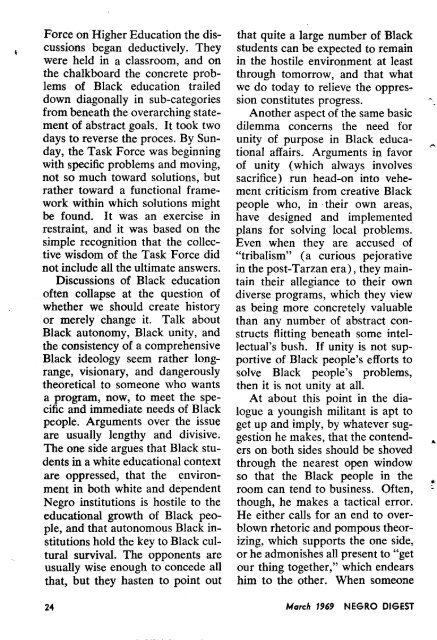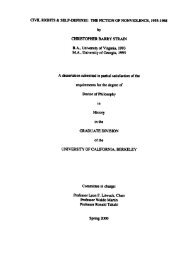Negro Digest - Freedom Archives
Negro Digest - Freedom Archives
Negro Digest - Freedom Archives
Create successful ePaper yourself
Turn your PDF publications into a flip-book with our unique Google optimized e-Paper software.
Force on Higher Education the discussions<br />
began deductively. They<br />
were held in a classroom, and an<br />
the chalkboard the concrete problems<br />
of Black education trailed<br />
down diagonally in sub-categories<br />
from beneath the overarching statement<br />
of abstract goals . It took two<br />
days to reverse the proces . By Sunday,<br />
the Task Force was beginning<br />
with specific problems and moving,<br />
not so much toward solutions, but<br />
rather toward a functional framework<br />
within which solutions might<br />
be found . It was an exercise in<br />
restraint, and it was based on the<br />
simple recognition that the collective<br />
wisdom of the Task Force did<br />
not include all the ultimate answers .<br />
Discussions of Black education<br />
often collapse at the question of<br />
whether we should create history<br />
or merely change it. Talk about<br />
Black autonomy, Black unity, and<br />
the consistency of a comprehensive<br />
Black ideology seem rather longrange,<br />
visionary, and dangerously<br />
theoretical to someone who wants<br />
a program, now, to meet the specific<br />
and immediate needs of Black<br />
people . Arguments over the issue<br />
are usually lengthy and divisive .<br />
The one side argues that Black students<br />
in a white educational context<br />
are oppressed, that the environment<br />
in both white and dependent<br />
<strong>Negro</strong> institutions is hostile to the<br />
educational growth of Black people,<br />
and that autonomous Black institutions<br />
hold the key to Black cultural<br />
survival. The opponents are<br />
usually wise enough to concede all<br />
that, but they hasten to point out<br />
24<br />
that quite a large number of Black<br />
students can be expected to remain<br />
in the hostile environment at least<br />
through tomorrow, and that what<br />
we do today to relieve the oppression<br />
constitutes progress .<br />
Another aspect of the same basic<br />
dilemma concerns the need for<br />
unity of purpose in Black educational<br />
affairs . Arguments in favor<br />
of unity (which always involves<br />
sacrifice) run head-on into vehement<br />
criticism from creative Black<br />
people who, in their own areas,<br />
have designed and implemented<br />
plans for solving local problems .<br />
Even when they are accused of<br />
"tribalism" (a curious pejorative<br />
in the post-Tarzan era), they maintain<br />
their allegiance to their own<br />
diverse programs, which they view<br />
as being more concretely valuable<br />
than any number of abstract constructs<br />
flitting beneath some intellectual's<br />
bush. If unity is not supportive<br />
of Black people's efForts to<br />
solve Black people's problems,<br />
then it is not unity at all .<br />
At about this point in the dialogue<br />
a youngish militant is apt to<br />
get up and imply, by whatever suggestion<br />
he makes, that the contenders<br />
on both sides should be shoved<br />
through the nearest open window<br />
so that the Black people in the<br />
room can tend to business . Often,<br />
though, he makes a tactical error .<br />
He either calls for an end to overblown<br />
rhetoric andpompous theorizing,<br />
which supports the one side,<br />
or he admonishes all present to "get<br />
our thing together," which endears<br />
him to the other . When someone<br />
March 1969 NEGRO DIGEST
















